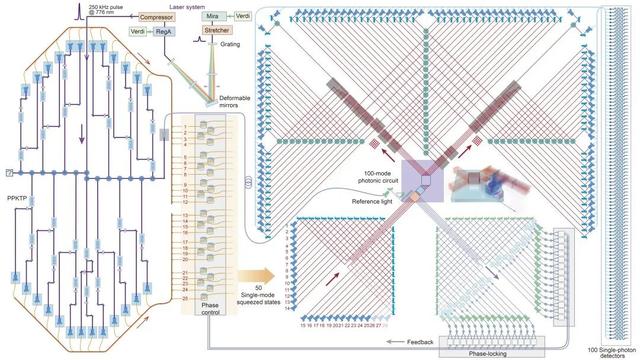On December 3, the University of Science and Technology of China announced that a research team composed of Pan Jianwei and Lu Chaoyang of the University of Science and Technology of China, in cooperation with the Shanghai Institute of Microsystems of the Chinese Academy of Sciences, and the National Center for Parallel Computer Engineering and Technology, has constructed 76 photons with 100 modes of quantum The computing prototype “Jiu Zhang” has realized the rapid solution of the practically promising “Gaussian Bose sampling” task.
It is reported that according to the existing theory, the quantum computing system can process Gaussian Bose sampling faster than the current fastest supercomputer one trillion times faster (“Jiu Zhang” task completed in one minute, the supercomputer needs 100 million years). Equivalently, its speed is 10 billion times faster than that of the 53 superconducting bit quantum computing prototype “Plalanus” released by Google last year.
The University of Science and Technology of China stated that this achievement enabled my country to successfully reach the first milestone in quantum computing research: the superiority of quantum computing. Related papers were published online in the international academic journal Science on December 4.

▲ “Jiu Zhang” quantum computing prototype optical system schematic diagram
According to reports, recently, Pan Jianwei’s team has independently developed a quantum light source with high efficiency, high identity, extremely high brightness, and large-scale expansion capabilities, while satisfying phase stability, fully connected random matrix, and wave packet coincidence degree better than 99.5%. A 100-mode interference circuit with a pass rate better than 98%, a phase-locking accuracy within 10-9 relative to the optical path, a high-efficiency 100-channel superconducting nanowire single-photon detector, and successfully constructed a Gaussian Bose with 76 photons and 100 modes Sampled quantum computing prototype “Jiu Zhang”.
According to the current best classic algorithm, “Jiu Zhang” can process Gaussian Bose sampling faster than the world’s No. 1 supercomputer “Fuyue”, which is equivalently faster than the 53-bit quantum released by Google last year. The computing prototype “Plalanus” is 10 billion times faster. At the same time, the superiority of quantum computing proved by Gaussian Bose sampling does not depend on the number of samples, which overcomes the loophole that the quantum superiority of Google’s 53-bit random line sampling experiment depends on the number of samples. The output quantum state space scale of “Jiu Zhang” has reached 1030 (the output quantum state space scale of “Plalanus” is 1016, and the current world storage capacity is 1022).